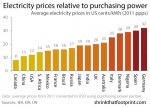- Joined
- Feb 24, 2014
- Messages
- 33,799
- Reaction score
- 26,550
- Location
- Oceania
- Gender
- Male
- Political Leaning
- Libertarian
Molten Thorium salt reactors "blow up"? Not really. The molten Salts can expand as teh reaction increases, cooling it in the process, and the self-sealing nature of the reactor is used in case of the liquid getting too hot. At the bottom of the container is a hole that, during normal function, is filled with hardened salt, but if the molten salt gets too hot the plug melts and the salts drain into a special shielded contain that stops the reaction. In other words, it is meltdown proof.
Ive been speaking to a NASA scientist about this via email and he says its something that should be considered for a Mars colony because its safe.

